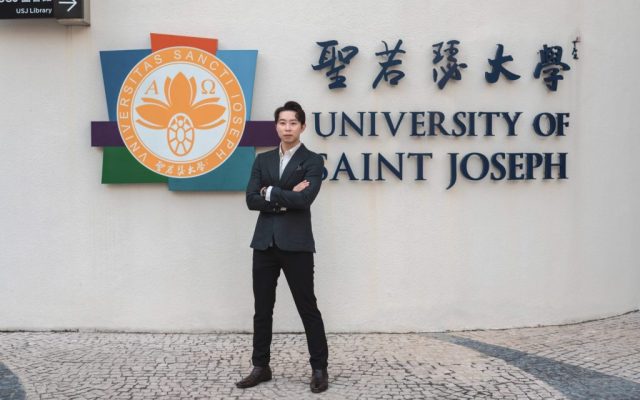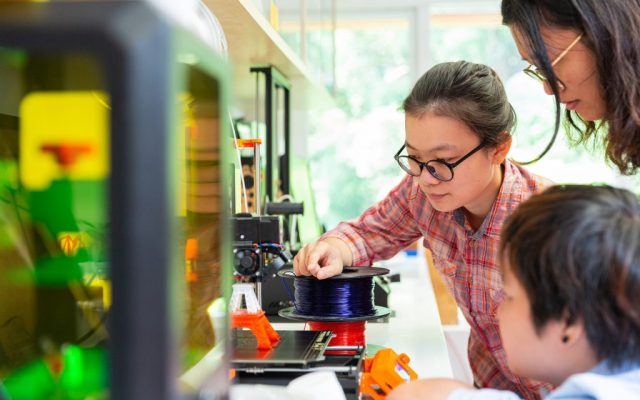Have you ever gone to the supermarket to buy a missing ingredient for dinner, only to walk out with a bag full of snacks you didn’t plan to buy? Or perhaps a flashy red “50% Off” caught your eye, and next thing you know, the cashier is swiping your credit card?
It’s no surprise: impulse purchases make us feel good, thanks to a surge in a brain chemical called dopamine, aka the “feel-good hormone”. That’s where neuromarketing comes in. This emerging cognitive science measures physiological and neural responses to pricing, branding and design to understand what makes consumers tick.
Neuromarketing is just one application of neuroscience (the study of the brain and nervous system) – a field in which Macao is poised to become an international leader thanks to the recently opened Laboratory of Applied Neurosciences at the University of Saint Joseph (USJ).
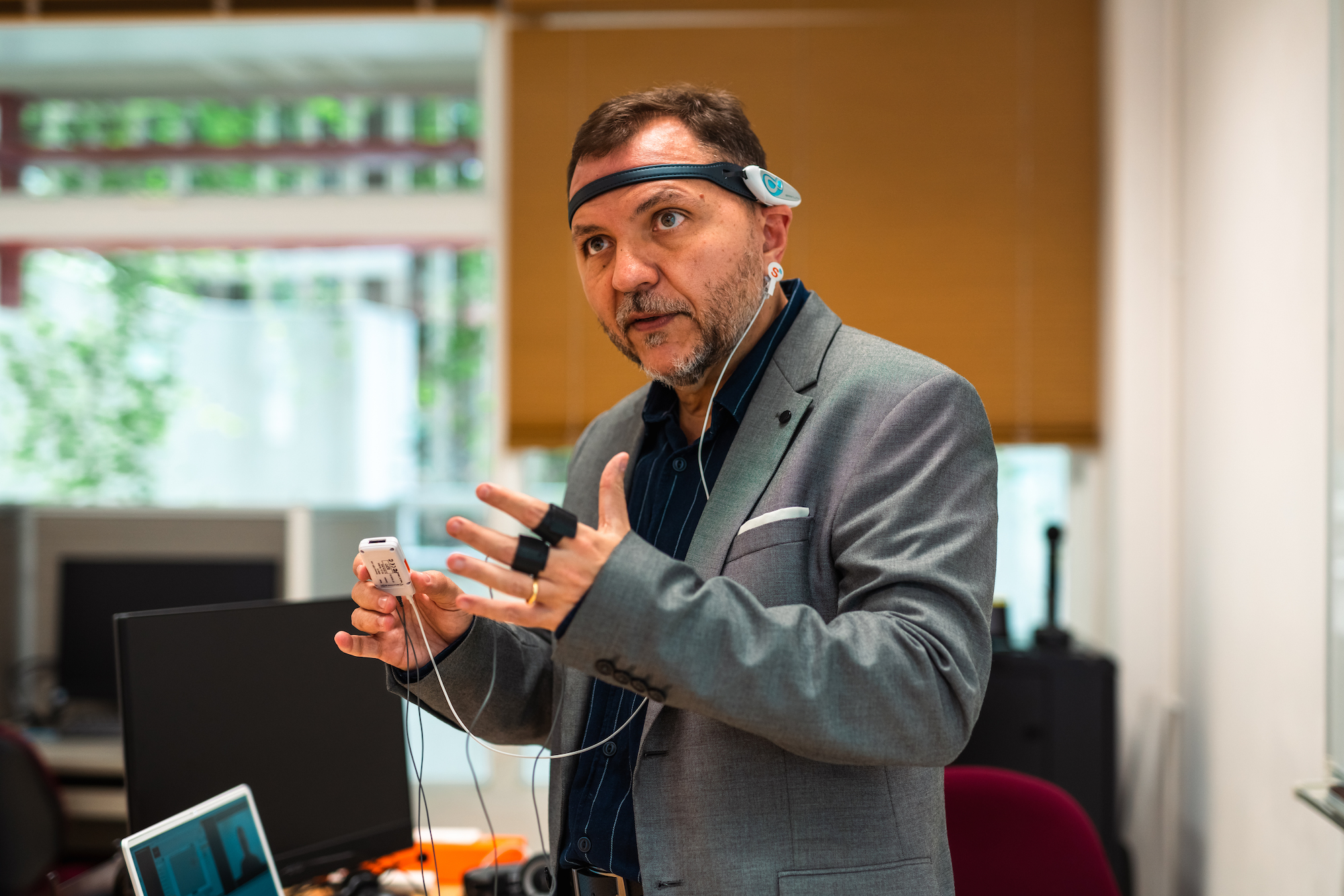
Officially opened in March 2022, the state-of-the-art lab is home to powerful tools and custom software that researchers can use in various fields, from neuromarketing to unlocking insights to refine advertisements or aiding studies on common neurodevelopmental disorders, the lab has the potential to redefine the way students, scientists and businesses conduct research.
Building a lab for the future
Alexandre Lobo, the head of USJ’s Department of Business Administration, has been studying neuroscience since 2008. When USJ offered him an opportunity to set up the Laboratory of Applied Neurosciences in Macao, the Brazilian native didn’t hesitate to relocate from Angola, on the West Coast of Africa. While Lobo has worked in many different laboratories in the past, this would be the first dedicated to applied neurosciences.
“The concept [underpinning our work] is the intersection between neuroscience and business. [In the lab], we monitor biosignals and physiological reactions when the subject is exposed to stimuli,” explains Lobo.
To conduct its work, the laboratory relies on cutting-edge biometric devices, including everything from eye trackers to heart rate sensors, sight-tracking glasses, and galvanic skin response (GSR) sensors for measuring sweat gland activity, to electroencephalograms (EEG) for recording brain activity.
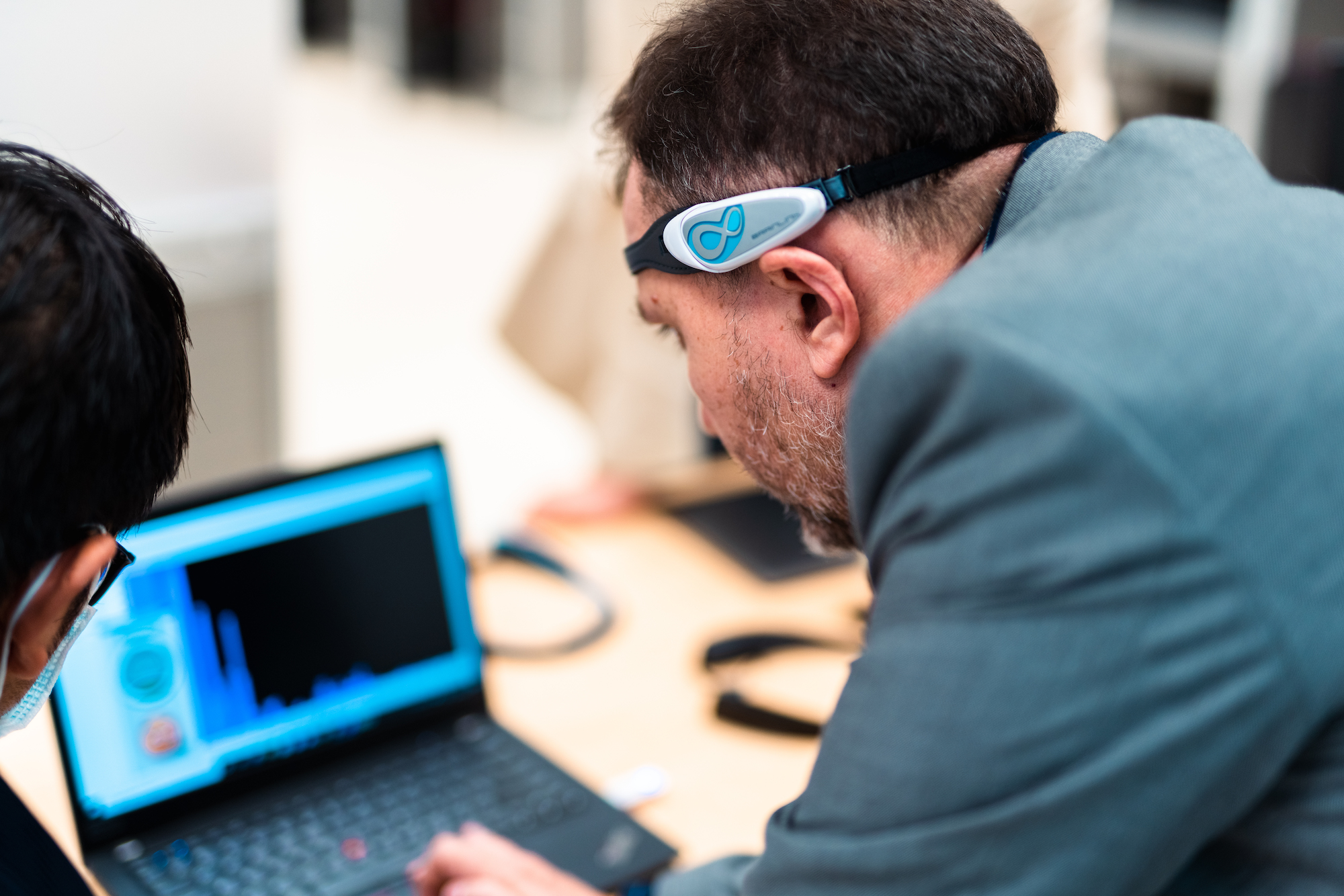
Setting up the lab has been a technical and financial feat, requiring an investment of more than MOP 1 million so far. Funding mostly came from the Macao Department of Education and Youth Development Bureau (DSEDJ) Higher Education Fund with the Macao Foundation, an institution that funds initiatives to promote the city, and Macrotellect, a pioneering medical lifestyle technology company in Shenzhen, providing financial and technical support to get the lab up and running in the autumn of 2021 as well.
For USJ associate professor and consumer behaviour specialist Alessandro Lampo, the investment will open up many doors for research. In particular, he says the neuroscience devices at the lab will offer greater precision and more possibilities than traditional methods.
“In research, we usually use questionnaires, so you rely on people remembering things or being honest. If you ask people if they would buy fair trade products even if they cost more, [respondents] may lie because they feel embarrassed or guilty,” Lampo explains. “But if you use this instrument, the [questionnaires] say one thing, but the body says something else.”
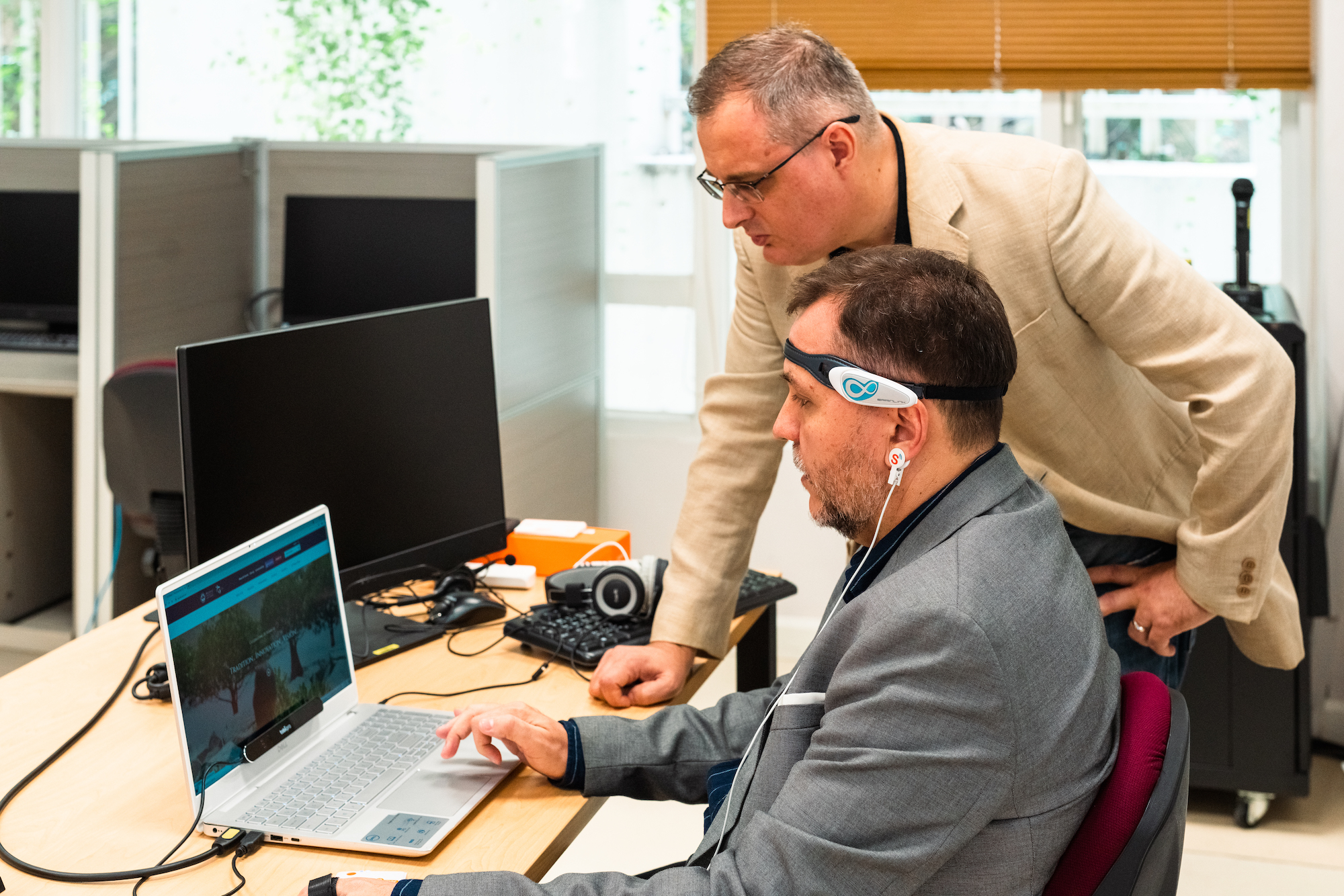
In addition to using cutting-edge equipment, researchers can also aggregate and analyse the data with USJ’s custom software – an integrated solution that sets the lab apart, says Lampo.
Using iMotions, a human behaviour research software programme as a base, the school hired computer engineers to develop additional functions, such as accepting data from the lab’s brain-scanning devices to register overlapping emotions. For example, the programme recognises that a spike in joy can also indicate increased excitement, which wasn’t possible previously. “USJ’s specialised software enables research methods that off-the-shelf offerings cannot,” Lobo says.
Lobo says programmers plan to use artificial intelligence to automatically classify data soon. That way, USJ’s software can analyse data more efficiently and independently while potentially identifying valuable information that researchers may have overlooked.
Unpacking consumer behaviour
Postgraduate students from the Faculty of Business and Law were among the first to use the lab during its soft opening in late 2021. In March, USJ moved the lab to its permanent location on the Ilha Verde campus and celebrated the official opening.
Andreia Neto, a marketing master’s student at USJ, has been using the lab’s facial expression analysis to study consumer behaviour and preferences. “Many consumer behaviour processes occur in the unconscious mind,” she explains. “[That is why] it can be difficult for consumers to explain why they prefer one product or brand among several options.”
Through her research, Neto is studying how lesser-known cosmetics brands from Asia and Portuguese-speaking countries are perceived by consumers and how they can improve their marketing strategies.
Also interested in marketing, PhD student and research assistant Ivy Ian is currently studying the impact of social media advertisements. “Consumer behaviours on smaller screens are different [from traditional advertising channels],” says the Faculty of Business and Law student. “They don’t have as much patience and attention, so that’s what I want to explore.”
Though Ian studied business administration and international marketing in the UK before enrolling at USJ, she did not encounter neuromarketing research equipment or techniques. With these new tools at her disposal, Ian plans to employ the eye-tracking equipment and GSR sensor to assess how participants respond to stimuli and, ultimately, better predict consumer behaviour.
Professor Lobo also highlights that there are PhD positions available in the university’s Institute for Data Engineering and Science. Doctoral candidates from this faculty specialise in Information Systems and can use their knowledge in AI Data Sciences to help with the software development side of the laboratory’s work.
Professors and academics are also taking advantage of the laboratory. For example, Lobo is currently collaborating with Marcus Goncalves from Boston University Metropolitan College on a research project examining the effectiveness of branding strategies deployed by sports bike brands. As a crucial component in the project, Lobo and other USJ researchers use the lab’s biometric data-collection tools for interviewing subjects and evaluating how different demographics react to marketing materials.
A world of possibilities
As the lab becomes more established, Lobo says USJ plans to eventually involve undergraduate students and expand beyond marketing and business applications. He also hopes to introduce the lab to other departments – such as psychology, linguistics or education – by the end of the year since the lab’s applied neuroscience tools can benefit many different fields of study.
“One of the key research [fields] we want to develop is related to stress in education – stress during exams, stress during exposure to [subjects] you’re uncomfortable with like maths,” he explains.
Neuroscience equipment and data analysis could also help second-language learners. “We can expose students [learning Chinese] to new Chinese characters and see how they react,” he says. The insights could shed light on the human learning process and impact teaching methods, materials, and curricula.
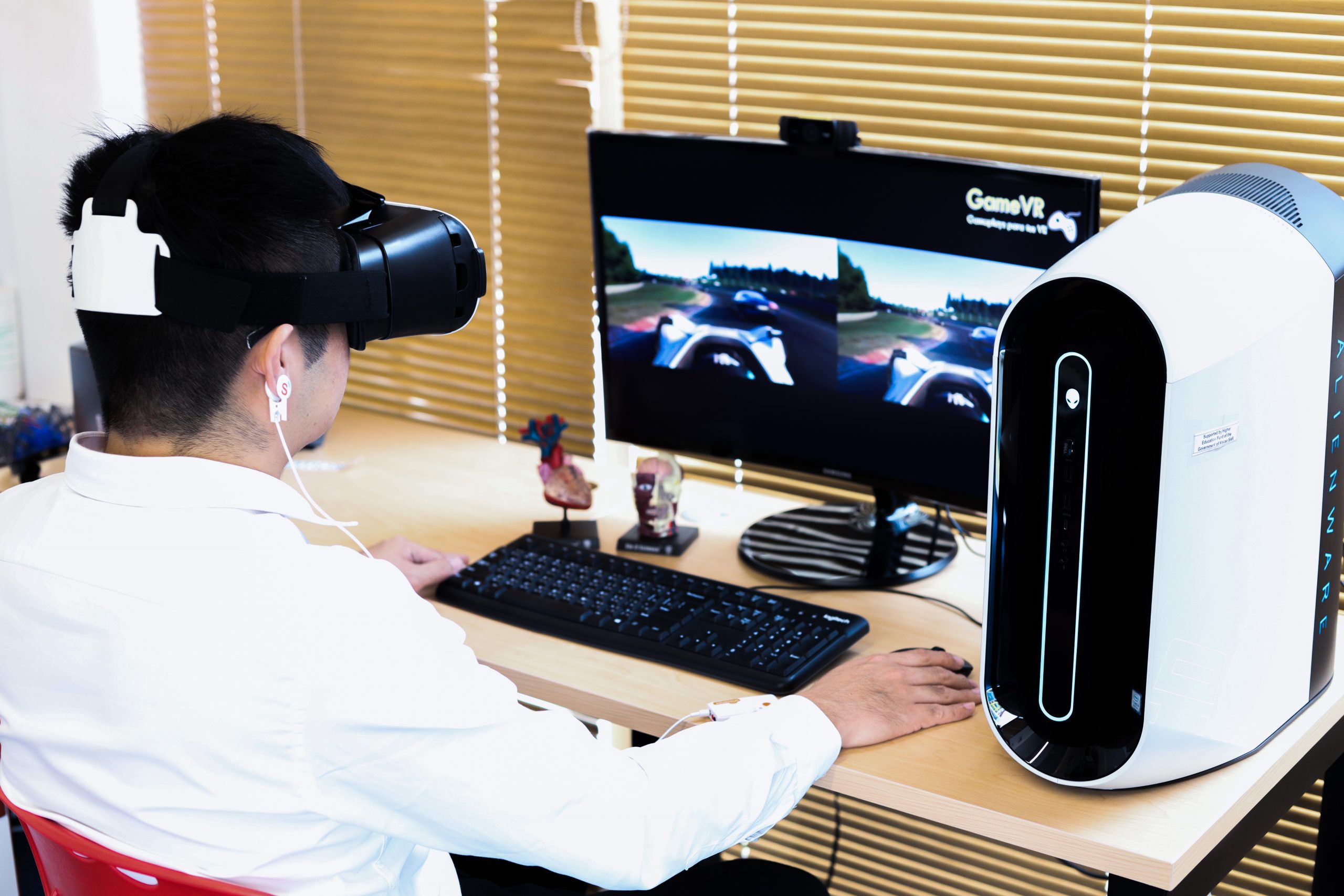
Lampo also believes the neuroscience lab has the potential to support psychiatric and healthcare research, such as studies on attention-deficit/hyperactivity disorder (ADHD) in children. For example, a USJ Faculty of Education staff member who has been collecting data on childhood ADHD in China could use the lab’s tools to discover ways to help children with ADHD improve focus and attention, he says.
In the future, the lab could offer neuromarketing expertise to private businesses, too. “One of our core ideas is to start developing a product [with our students] that can offer some kind of service or training to businesses,” says Lampo, adding that he hopes to see more real-world applications in addition to research.
For now, though, Lampo wants to focus on USJ students to ensure they make the most of the new laboratory, which he believes will arm them with valuable experience and insights in the marketing industry. “This could give our students an edge… because this is where marketing is heading,” says Lampo. “This is the advantage we are offering our students.”

